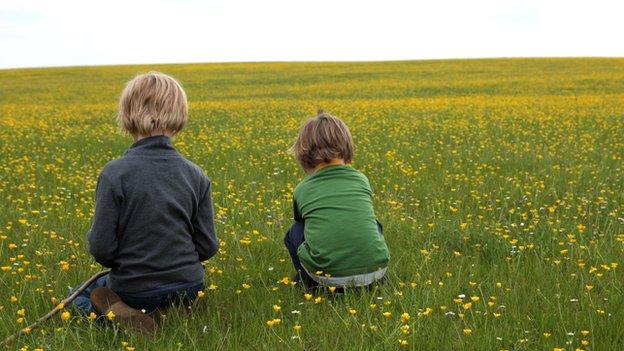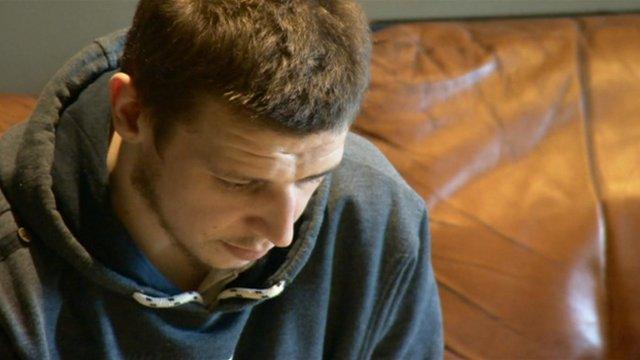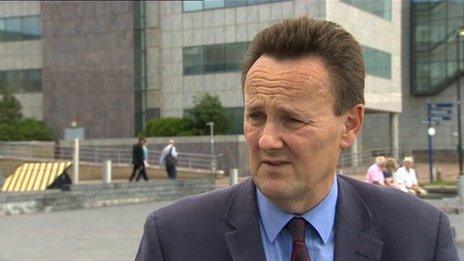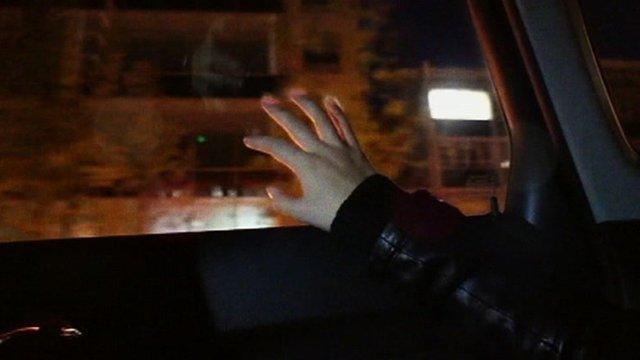Offending rates among children in care investigated
- Published
Russell: "Social services make you think Tracy Beaker is real... it's nothing like that."
An independent review is being launched to examine why so many children in care in England and Wales end up in the criminal justice system.
The Prison Reform Trust, which set up the review, external, says children aged 10 to 17 in care are more than five times as likely to be in trouble than others.
The Lord Laming-led inquiry will look at how often children change home and how authorities deal with behaviour.
A government spokeswoman said they were committed to helping care leavers.
Fewer than 1% of children and young people are in the care of local authorities, but a third of boys and 61% of girls in custody either are in care or have been, Lord Laming - a former probation officer and social worker - said.
"It is a huge step for the state to assume the parenting of a child or young person," he added. "With that comes the responsibility to provide stability, security and hope for the future."
'Pretty unsettled'
While 10-17 year olds in care have a higher chance of being convicted or subject to a final warning or reprimand than other children, the trust says nearly two-thirds of them are in care because they have suffered abuse or neglect.
Only 2% are taken into care primarily because of their own socially unacceptable behaviour, according to government figures from 2014.
Liberal Democrat peer Lord McNally, chair of the Youth Justice Board, told the Victoria Derbyshire programme: "There should be a national protocol so that incidents in a children's home are treated as they would be in a family, with a sense of proportion.
"At the moment there's a lot of the machinery that ticks a box that says somebody throws a paddy and breaks something, that has to be reported to the police."
The trust cited examples of young people's experiences.
One girl with a criminal conviction said: "I was moving round children's homes, I was pretty unsettled, I was starting school, then coming out of school, then home schooled, then finishing home school because I couldn't stay in that placement."
Lord Laming: "The state not only has a duty to be a parent, but it has a moral responsibility to be a really good parent"
Another young person said: "What I've heard from different police officers when I've been arrested, it's like, 'You're a kid in care, you're never going to get out of this way of life'."
And Russell, who was taken into care as a teenager and has spent time in a young offenders institution, told the BBC: "If I'd had the support around me when I was younger, I would have stayed as smart and sweet and innocent - but it was the fact that I've built myself up with so much anger. I'm not used to anyone supporting me."
A Department for Education spokeswoman said the government had put in place "comprehensive and far-reaching support" so that "young people leaving care are now receiving more help than ever before".
She said: "The number of care leavers recorded as being in custody has fallen faster than the general child population since 2010.
"However, we welcome this review. It is a critically important issue affecting the most vulnerable children in society and we look forward to seeing Lord Laming's report."
'Depressing route'
Lord Laming, who has chaired previous inquiries looking at failures to protect at-risk children, including Victoria Climbie, said: "We cannot stand by and allow wasted opportunities to result in wasted later lives.
"We are determined to ensure this review makes practical recommendations to enable key services to work together to help children in care transform their life chances and stay out of trouble."
An NSPCC spokesman said: "The fact that the majority of children in care have suffered abuse or neglect means they need extra help to rebuild their lives and they must not be written off by society.
"Being a victim of abuse is not an excuse for criminal behaviour but nor should the care system be a stepping stone to a life behind bars."
Darren Coyne, projects and development worker at the Care Leavers' Association, said the majority of people in care do not go on to offend - and that it was often those who fell "through the gaps" that ended up in trouble.
Speaking to BBC Breakfast, he said those who had suffered abuse, neglect or trauma may "present with some challenging behaviour", but that "if it's reacted to with the criminal justice system, that's the wrong approach".
Juliet Lyon, director of the Prison Reform Trust, said: "There is a depressing route from care to custody which can, and must, be stopped.
"We need to listen to children in care about how they got drawn into trouble and hear their views on ways to get out of it."
The consultation group is holding its first meeting, chaired by Lord Laming, at the House of Lords on Thursday.
The team is expected to report its findings early next year.
- Published11 March 2015

- Published30 January 2015

- Published25 September 2012
- Published10 July 2014

- Published21 May 2012
